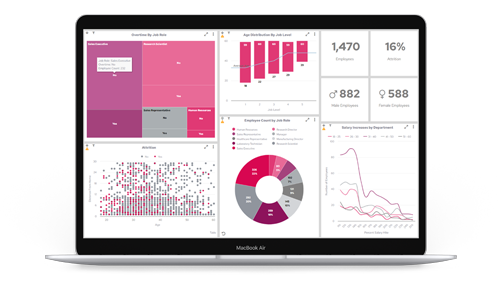In today's rapidly evolving financial landscape, the integration of Artificial Intelligence (AI) has become a game-changer for the Fintech industry. AI is revolutionizing how financial institutions operate, making them more efficient, secure, and customer-centric.
In this blog, we delve into the various ways AI is changing the Fintech sector, including the impact of Causal AI that's been included in the Gartner Hype Cycle for Emerging Technologies, highlighting AI's impact on fraud prevention, customer service, risk management, and more.
Enhancing fraud detection and prevention
First up, let's take a look into how Artificial Intelligence (AI) has revolutionized fraud detection and prevention in the Fintech industry. Traditional methods of identifying fraudulent activities often relied on predefined rules and manual reviews, which were not only time-consuming but also prone to human error. AI, however, leverages machine learning algorithms to analyze vast amounts of transaction data in real-time, identifying patterns and anomalies that may indicate fraudulent behavior.
For instance, AI systems can monitor transactions across multiple channels and flag suspicious activities based on historical data and behavioral analysis. This proactive approach not only helps in detecting fraud more accurately but also in preventing it before significant damage occurs. By continuously learning from new data, AI models can adapt to emerging fraud tactics, ensuring that financial institutions stay one step ahead of fraudsters. This dynamic and adaptive nature of AI-driven fraud detection systems significantly reduces the risk of financial losses and enhances the overall security of financial transactions.
Benefits:
- Real-time fraud detection and prevention.
- Reduced risk of financial losses.
- Enhanced security of financial transactions.
- AI adapts to emerging fraud tactics.
- Increased trust and confidence among customers.
- Lowered operational costs due to reduced manual intervention.

Personalized financial services
Next, AI has enabled the delivery of highly personalized financial services. By analyzing customer data, including spending habits, income patterns, and financial goals, AI algorithms can provide tailored financial advice and product recommendations. This level of personalization was previously unattainable with traditional financial advisory services.
For example, AI can be used to create customized investment portfolios based on an individual's risk tolerance, financial goals, and market conditions. AI-driven platforms continuously monitor and adjust the portfolios to optimize returns, providing a level of service that is both cost-effective and accessible to a broader audience. This personalized approach not only enhances customer satisfaction but also fosters long-term loyalty. By offering bespoke financial solutions, AI helps financial institutions build stronger relationships with their clients, ultimately driving customer retention and growth.
Benefits:
- Tailored financial advice and product recommendations.
- Customized investment portfolios.
- Enhanced customer satisfaction and loyalty.
- Cost-effective and accessible financial services.
- Improved financial literacy and empowerment for customers.
- Increased customer engagement through personalized interactions.
Enhanced risk management
Risk management is a critical aspect of the financial industry, and AI has significantly enhanced its effectiveness. AI algorithms can analyze vast datasets, including market trends, economic indicators, and historical data, to identify potential risks and predict future market movements. This predictive capability allows financial institutions to make more informed decisions and mitigate risks proactively.
Causal AI is leading the way in predictive AI capabilities and represents a significant advancement in the realm of artificial intelligence. This form of AI offers the ability to understand not just correlations but actual cause-and-effect relationships within data. This capability is particularly transformative for the Fintech industry, where understanding the underlying causes of financial behaviors and market movements can lead to more effective strategies and solutions.
For instance, Causal AI can help financial institutions determine the true drivers behind customer churn, enabling them to implement more targeted retention strategies. It can also be used to identify the root causes of market volatility, allowing for more precise risk management and investment decisions. By leveraging causal AI, fintech companies can gain deeper insights that drive more informed and impactful decision-making. This comprehensive analysis provides a more accurate assessment of creditworthiness, reducing the likelihood of defaults. Moreover, AI-driven risk management systems can continuously monitor and adjust risk models based on new data, ensuring that financial institutions remain resilient in the face of changing market conditions.
Benefits:
- Proactive risk identification and mitigation.
- Deeper insights into financial behaviors and market movements.
- More accurate assessment of creditworthiness.
- Continuous monitoring and adjustment of risk models.
- Improved regulatory compliance and reporting.
- Enhanced the ability to anticipate and respond to market changes.

Enhancing data-driven decision-making
Data-driven decision making is at the core of modern Fintech operations, and AI plays a pivotal role in this process. By leveraging advanced analytics and machine learning, AI can extract valuable insights from large and complex datasets, enabling financial institutions to make more informed and strategic decisions.
For example, AI can analyze customer data to identify trends and patterns that inform product development, marketing strategies, and customer engagement initiatives. This data-driven approach not only enhances operational efficiency but also drives innovation and competitive advantage. Additionally, AI-powered analytics can help financial institutions identify new market opportunities and optimize resource allocation, further enhancing their ability to achieve business objectives. By making data-driven decisions, financial institutions can stay ahead of the competition and better serve their customers' evolving needs.
Benefits:
- Informed and strategic decision-making.
- Enhanced operational efficiency.
- Help in identify new market opportunities.
- Optimized resource allocation.
- Accelerated innovation and product development.
- Improved customer targeting and engagement.
Enhancing customer insights
Understanding customer behavior and preferences is crucial for financial institutions, and AI has significantly enhanced their ability to gain these insights. By analyzing customer data, AI can identify patterns and trends that inform customer segmentation, product development, and marketing strategies.
For example, AI can analyze transaction data to identify spending patterns and predict future behavior. This information can be used to develop targeted marketing campaigns, personalized product recommendations, and loyalty programs that resonate with customers. By leveraging AI-driven insights, financial institutions can enhance customer engagement and drive business growth. This deeper understanding of customer needs and preferences allows financial institutions to offer more relevant and timely services, ultimately improving customer satisfaction and loyalty.
Benefits:
- A deeper understanding of customer behavior and preferences.
- Targeted marketing campaigns.
- Personalized product recommendations.
- Improved customer satisfaction and loyalty.
- Increased customer retention and lifetime value.
- Enhanced ability to anticipate and meet customer needs.
In conclusion
AI is undeniably transforming the Fintech industry, driving innovation and enhancing operational efficiency across various domains. From fraud detection and personalized financial services to customer service and risk management, AI is enabling financial institutions to deliver better outcomes for their clients and stay competitive in a rapidly evolving market. As AI technology continues to advance, its impact on Fintech will only grow, offering new opportunities and challenges for the industry.






















